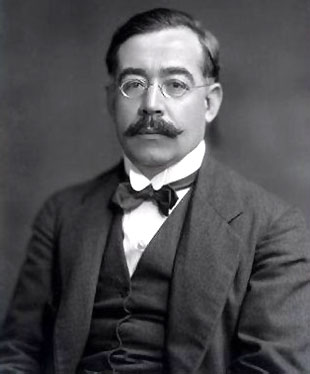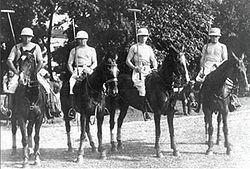
Polo or Chovgan is a ball game that is played on horseback, a traditional field sport and one of the world's oldest known team sports. It originated in ancient Persia, dating back over 2,000 years. Initially played by Persian nobility as a training exercise for cavalry units, polo eventually spread to other parts of the world. The game is played by two opposing teams with the objective of scoring using a long-handled wooden mallet to hit a small hard ball through the opposing team's goal. Each team has four mounted riders, and the game usually lasts one to two hours, divided into periods called chukkas or chukkers.

Leopoldo Antonio Lugones Argüello was an Argentine poet, essayist, novelist, playwright, historian, professor, translator, biographer, philologist, theologian, diplomat, politician and journalist. His poetic writings are often considered to be the founding works of Spanish-language modern poetry. His short stories made him a crucial precursor and also a pioneer of both the fantastic and science fiction literature in Argentina.
Enrique is the Spanish variant of the given name Heinrich of Germanic origin.
The Campeonato Argentino Abierto de Polo is an international polo championship at club level, organised every year since 1893 at the Campo Argentino de Polo of Palermo, Buenos Aires.
Juan Garcia may refer to:

Mexico competed at the 1964 Summer Olympics in Tokyo, Japan. 94 competitors, 90 men and 4 women, took part in 58 events in 15 sports. As the country hosted the next Olympics in Mexico City, the flag of Mexico was raised at the closing ceremony.
El Acompañamiento is a 1991 Argentine musical drama film directed and written by Carlos Orgambide. The musical was based on a play by Carlos Gorostiza.

A polo tournament was contested at the 1924 Summer Olympics in Paris. The competition ran from 28 June to 12 July at the Château de Bagatelle and the Saint-Cloud Racecourse, with five teams competing. Argentina won the gold medal, beating all four of the other nations in the country's Olympic polo debut. Silver went to the United States, which played in—and won—the first three games of the tournament before a close-played (6–5) loss to Argentina in game 6. Great Britain, the two-time defending champions, finished with bronze.

Manuel Ferreira was an Argentine footballer who played as a forward.

Tiempo de revancha is a 1981 Argentine political thriller film written and directed by Adolfo Aristarain and starring Federico Luppi, Julio De Grazia, Haydée Padilla and Ulises Dumont. It was produced by Héctor Olivera and Luis O. Repetto. The music was composed by Emilio Kauderer. The film premiered in Argentina on July 30, 1981, and won 10 awards, including the Silver Condor for Best Film and Best Film in the Montréal World Film Festival.

Enrique Jorge Morea was an Argentine tennis player.
Elmer Julius Boeseke, Jr. was an American polo player who competed in the 1924 Summer Olympics. He was born in Santa Barbara, California. In 1924 he won the silver medal with the American team in the Olympic polo tournament.

Juan Bautista Miles Passo was an Argentine polo player who competed in the 1924 Summer Olympics. He was born and died in Buenos Aires. His nickname was "El Sordo" due to his hearing problems he got while he was working for a Railway Company in Buenos Aires. In 1924 Miles was part of the Argentine polo team, which won the gold medal.
Guillermo Brooke Naylor was an Argentine polo player who competed in the 1924 Summer Olympics. In 1924 he was part of the Argentine polo team, which won the gold medal.
Enrique Conrado Sieburger was an Argentine sailor and Olympic medalist. He competed at the 1948 and 1952 Summer Olympics.
Enrique Adolfo Sieburger was an Argentine sailor and Olympic medalist. He was born in Vicente López, Buenos Aires Province, Argentina. He competed at the 1948 and 1960 Summer Olympics.

Lewis Lawrence Lacey was a Canadian polo player.
Enrique Padilla may refer to:

Mexican sex comedies are films within the comedy film genre of the Mexican cinema industry, though in a class of their own. The storylines typically revolve around themes of sexploitation and "Mexploitation". They are mostly recognized as low-quality films with fairly low budgets. The genre peaked in popularity in the 1970s and 1980s. Although the films had sexually suggestive plots and used numerous comedic innuendos and double entendres, they were not overtly explicit, and were never considered to be pornographic. Furthermore, it was not uncommon for the male characters in these films to comedically fail in their attempts to win over, or have sex with, the female characters. When a man was successful in wooing a woman, the performances were deliberately over-exaggerated and pantomime-like, aiming to generate laughter more than arousal. The genre is similar to, and possibly influenced by, Italian erotic comedies. The popular term "ficheras films" came from the film Las ficheras, produced and released in 1975, which told the stories and experiences of many dancing women who entertained men at nightclubs.
Enrique Granados was a Spanish water polo player. He competed at the 1920 Summer Olympics and the 1924 Summer Olympics.










